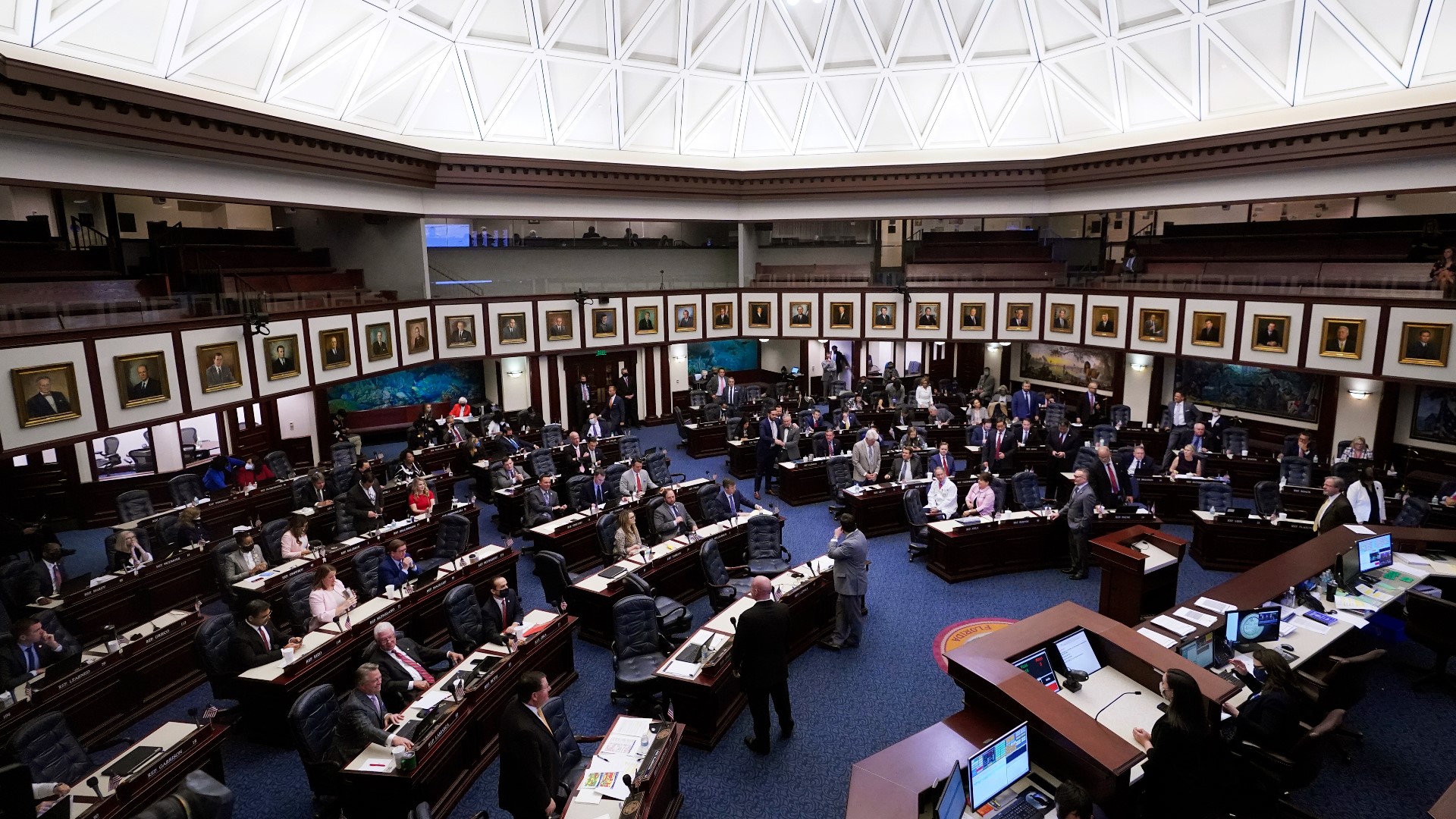TALLAHASSEE, Fla. — Florida lawmakers passed a controversial bill that severely restricts abortion after 15 weeks, with few exceptions, sending the measure to Gov. Ron DeSantis for a final signature.
Senators voted 23-15 in favor of the measure late Thursday. DeSantis said during a news conference Friday, "I think that protections are warranted, and I think that we'll be able to sign that in short order." He previously called the bill "reasonable" and "supportive of protecting life."
The legislation bans abortion if a doctor finds the gestational age of a fetus is more than 15 weeks. Exceptions are allowed if the woman's life is considered to be in danger or if the fetus is considered to have a "fatal fetal abnormality."
Two physicians must certify "the termination of the pregnancy is necessary to save the pregnant woman’s life" or avert serious irreversible impairment. Democratic lawmakers proposed an amendment to allow just one physician to make that judgment, but it was rejected.
Another proposed amendment would've required the father of the unborn child to start paying child support at 15 weeks into the pregnancy. It, too, failed.
The bill does not allow exceptions for victims of rape, incest or trafficking despite efforts by some Democratic lawmakers, including Sen. Lauren Book, D-Plantation, who proposed amendments in an attempt to change this.
"I was drugged, I was put in a room, and I was raped by multiple men,” Book shared with her colleagues on the Senate floor Wednesday. “Thankfully, I didn't become pregnant as a result of that assault. I was simply trying to survive, but many young girls aren't so lucky."
Prior to the bill possibly becoming law, abortion in Florida is legal up to 24 weeks into gestation and allowed thereafter only if it threatens a woman's life and physical health.
In response to the bill passing, agricultural commissioner and gubernatorial candidate Nikki Fried voiced her displeasure, calling Florida's legislature "anti-women."
Democratic U.S. Rep. Charlie Crist, who's also seeking the governor's office for another term, called it an "attack on Row v. Wade."
"A vast majority of Floridians support and respect a woman’s right to choose," he said in a statement. "Yet the Republican controlled Florida Legislature acted into the late hours of the night to attack Roe v. Wade and undermine a woman’s right to choose.
"Governor DeSantis has made his anti-women stance clear, but he still holds the veto pen and the people of Florida demand he do the right thing and stop this legislation from becoming law."
Speaker of the Florida House Chris Sprowls thanked senators who "believe that life matters."
In a statement, Rep. Anna Eskamani (D-District 47) called the bill the most "extreme anti-abortion" bill to pass the Florida Legislature.
"It is a direct assault on the people of Florida and our constitutional rights," Eskamani's statement read.
The 15-week restriction is similar to a controversial Mississippi law that's currently being reviewed by the U.S. Supreme Court.
In response to earlier questions about whether Florida's proposed restrictions are unconstitutional, House Speaker Chris Sprowls told 10 Tampa Bay the expectation is for the high court to uphold the Mississippi law.
A ruling is expected in June.
But even if the U.S. Supreme Court were to uphold Mississippi's ban, which would allow the Florida ban to become law, that might not be the end of the story, Stetson University College of Law constitutional law professor Louis Virelli previously told 10 Tampa Bay.
"The Florida statute will still be challenged under the Florida Constitution and the right to abortion in Florida is stronger than the right to abortion in the country as a whole," he said. "The Florida Constitution protects the right to end a pregnancy better or more rigorously than the U.S. constitution does.”
Virelli says to survive under the Florida Constitution, there has to be a compelling government interest and be the least restrictive means of achieving that interest.
He says, over the years, the court has not viewed protecting a fetus in the first trimester as compelling government interest.
According to Florida's Agency for Health Care Administration, 79,648 abortions were performed statewide in 2021. Of those, 93.9% were in the first trimester and wouldn't be affected by this bill.
A total of 4,538 abortions were performed statewide in the second trimester. AHCA listed none in the third.
Of the second trimester abortions, 484 were performed due to "serious fetal genetic defect, deformity or abnormality" while 21 were performed due to a "life endangering physical condition." The 21 would be exempt from the bill. Some of the 484 might be, too, if the fetal abnormality was fatal; but others might not.
In other words, a total of 4,033 women would've definitely been affected by the Florida bill if it had been law last year – give or take some, depending on how the 484 cases were ultimately classified.
One of the big topics during the Senate debate was rape and incest, for which this bill did not include exceptions. For context, in 2021, 14 second-trimester abortions were performed due to rape while three were performed due to incest.
As currently written, and without being delayed by the courts, the bill would take effect on July 1 if DeSantis signs it into law.

